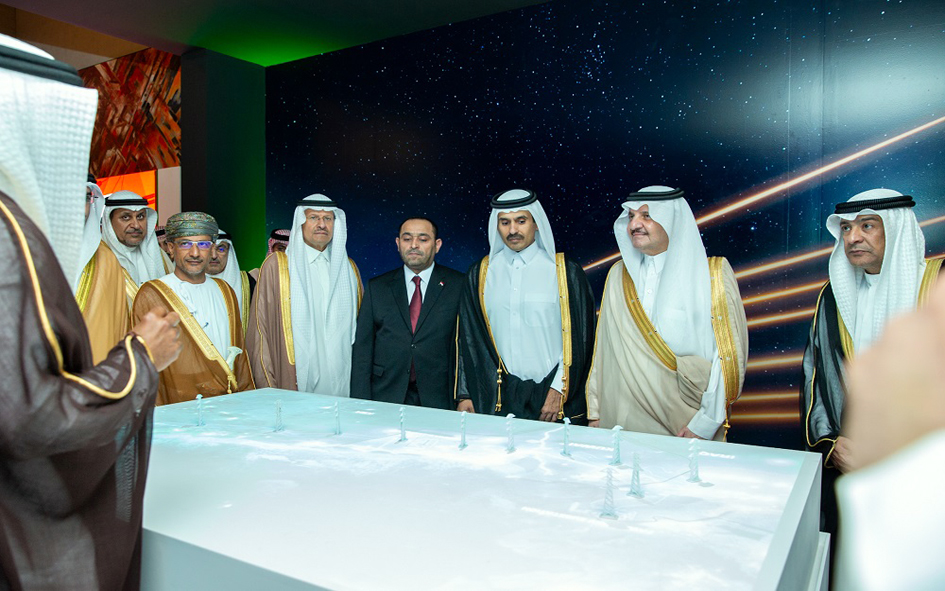GCCIA Commences Implementation of Mega Interconnection Project with Iraq in the Presence of Electricity Ministers, Ambassadors, and Senior Officials from Gulf and Iraq

Al Khobar, Saudi Arabia, 10 June 2023
His Royal Highness Prince Saud bin Naif bin Abdulaziz, the Governor of the Eastern Province, inaugurated the commencement of the electrical interconnection project between the GCC Interconnection Authority and the Republic of Iraq. This momentous event witnessed the presence of esteemed dignitaries including His Royal Highness Prince Abdulaziz bin Salman bin Abdulaziz, the Saudi Minister of Energy, Engineer Ziyad Ali Fadel, the Iraqi Minister of Electricity, a number of Gulf Arab ministers of electricity, Gulf ambassadors to the Kingdom, as well as several officials from both the Gulf and Iraq.
His Royal Highness Prince Saud bin Naif bin Abdulaziz, the Governor of the Eastern Province, conveyed his immense joy and satisfaction in commemorating the remarkable achievement accomplished by the GCCIA. He viewed this momentous occasion as a blessed result of the collective endeavors within the Gulf Cooperation Council (GCC), underscoring their unwavering dedication to fruitful cooperation. By inaugurating the electrical interconnection project with the esteemed nation of Iraq, he emphasized the extensive advantages and abundant prosperity it would bring to the entire region. Additionally, he highlighted that this project serves as a catalyst for a new era, ushering in broader horizons and expanding market opportunities.
His Royal Highness Prince Saud bin Naif bin Abdulaziz, the Governor of the Eastern Province, emphasized, “The electrical interconnection project stands as a testament to the unwavering support and guidance of the Custodian of the Two Holy Mosques, His Royal Highness the Crown Prince, and the esteemed leaders of the Gulf Cooperation Council (GCC) countries. Since its establishment in 2009, when the Kingdom embraced it, the project has consistently demonstrated its impact year after year, generating numerous economic advantages for the GCC countries. Notably, it has substantially reduced both the capital and operational expenses associated with the Gulf electricity network.”
Moreover, His Royal Highness Prince Saud bin Naif bin Abdulaziz highlighted, “According to the studies conducted, the project has furnished approximately half of the overall required energy reserves in the countries prior to the finalization of the electrical interconnection. Furthermore, it has established dependable, sustainable, and competitive electricity transmission services, yielding a positive influence in supporting and streamlining all developmental endeavors in the region.”

His Royal Highness Prince Saud bin Naif bin Abdulaziz added: “With the inauguration of the interconnection project with our esteemed sisterly nation, Iraq, the electrical interconnection endeavor expands its horizons, entering a broader realm. Through this collaboration, we achieve a multitude of objectives, elevating the stature of the Gulf Cooperation Council (GCC) countries in bolstering and enhancing the value of the regional electricity market. The project fulfills the aspirations of the people in the region for electricity trade and exchange, while also serving as an integral component of the comprehensive Arab electrical interconnection project, which aims to connect Arab nations with each other. Moreover, it lays the foundation for potential future expansion to even more distant locations, as inspired by the will of the Almighty.”
During the ceremony, His Royal Highness Prince Abdulaziz bin Salman bin Abdulaziz, the Minister of Energy, stated, “The start of the implementation of the electrical interconnection project between the Gulf Cooperation Council (GCC) electrical grid and the southern grid of the Republic of Iraq, which was signed on the sidelines of the ‘Jeddah Summit for Security and Development’ in July last year, represents one of the projects aimed at enhancing cooperation between the GCC countries and the esteemed Republic of Iraq in the economic and social fields.”
His Royal Highness conveyed his utmost gratitude and deep appreciation to the Custodian of the Two Holy Mosques, King Salman bin Abdulaziz Al Saud, and to His Royal Highness Prince Mohammed bin Salman bin Abdulaziz, Crown Prince and Prime Minister of Saudi Arabia, may Allah protect them. He also expressed profound gratitude to the Majesties and Highnesses, the leaders of the Gulf Cooperation Council (GCC) countries, along with the esteemed Iraqi leadership, for their consistent support and steadfast endorsement of the Gulf electrical interconnection project.
Regarding the Saudi-Iraqi direct electrical interconnection project, it is being executed in accordance with the principles delineated in the agreement signed between the two parties. This project spans from the northern city of Arar in the Kingdom of Saudi Arabia to Yusufiya in western Baghdad, boasting an initial capacity of 1000 megawatts. Once finalized and operational, the project, alongside the Gulf-Iraq electrical interconnection project, will provide substantial assistance to the Iraqi electrical grid, augmenting its capability to meet the growing electricity demands of the Iraqi population in the upcoming years. Furthermore, it will fortify the security and stability of interconnected electrical networks.
During his address, Engineer Ziyad Ali Fadel, the Iraqi Minister of Electricity, underscored the significance of the Gulf-Iraq electrical interconnection project, emphasizing its strategic importance in terms of Arab integration in the realm of electrical energy. He highlighted how this project acts as a vital conduit linking Iraq to its Arab Gulf counterparts.
He further mentioned that following the signing of the framework agreement between the Iraqi Ministry of Electricity and the GCCIA in 2019, the laying of the project’s foundation stone represents a tangible manifestation of direct cooperation with their brethren, particularly with the GCCIA. The project entails the implementation of a dual-circuit transmission line spanning from the Al-Zour Substation (400 kV), passing through the Al-Wafrah Substation (400 kV), and reaching the Al-Faw Substation (400 kV), encompassing a total length of 322 km. The anticipated capacity to be imported through this initiative is estimated at 500 megawatts, thereby catering to the electricity requirements of the Basra Governorate.
HE Jasem Al-Budaiwi, the Secretary-General of the Gulf Cooperation Council, emphasized the significance of the Gulf Power Interconnection Project as a crucial infrastructure initiative linking the member states. Its primary objectives include addressing the loss of generation capacity during emergencies, reducing generation reserves in member countries, mitigating carbon emissions, minimizing costs associated with fiber optic network infrastructure, and facilitating the exchange and trade of electrical energy among member states. These efforts contribute to the economic aspects, enhance the reliability of the power supply, and effectively handle emergency situations.
He further emphasized that the project is part of the integrative projects established among the GCC countries, thanks to the guidance and support provided by the esteemed leaders of the GCC states. All these endeavors aim to achieve further progress and development within the GCC countries, ultimately fulfilling the hopes and aspirations of the citizens of the GCC states.
Engineer Mohsin Hamed Al Hadhrami, the Chairman of the GCCIA, highlighted the significance of the Gulf Power Interconnection Project as one of the most crucial infrastructure ventures authorized by the esteemed leaders of the Gulf Cooperation Council (GCC) countries.
He further emphasized that the Gulf strategic project has consistently yielded technical and economic benefits for the GCC countries over the years. It plays a vital role in supporting emergency situations by preventing power outages within the networks of the GCC countries. This is achieved by promptly providing assistance during emergencies through the transmission of the required energy via the extensive Gulf Power Interconnection network, which spans approximately 1,050 kilometers from Kuwait to Oman.
Engineer Ahmed Al-Ebrahim, the CEO of the GCCIA, affirmed that since 2016, the GCCIA and the energy ministries of the GCC countries have established a platform for the energy exchange. This platform sets the stage for realizing the Arab aspiration of interconnection with Iraq, followed by Jordan and Egypt, thus creating the ‘Arab Common Electricity Market’. He mentioned that the forthcoming plan for interconnection beyond the GCC system involves connecting with Jordan and Egypt, and they are presently conducting the final feasibility study for interconnection to reach Europe.
He also highlighted the GCCIA’s leadership in alliances for renewable energy and the integration of renewable energy sources into the electricity grids of GCC countries. These countries have ambitious plans and projects for electricity generation utilizing renewable energy and adopting the best technologies, aligning with the visions of the esteemed leaders of the GCC.
Furthermore, he revealed the intention to increase investments in Gulf electricity networks by approximately $1.5 billion over the next five years. These investments will support three major projects, including the expansion of electricity interconnection with Kuwait, the expansion of electricity interconnection with the United Arab Emirates, and the establishment of direct interconnection with the Sultanate of Oman. He emphasized that the increased investment in Gulf electricity networks will enhance the capacity for electricity interconnection with these Gulf countries.






